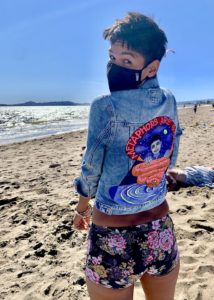By Kate Morales
It is with a lot of pride that I take my place in the long lineage of brave queers before me who believed, in the face of a society that would prefer them dead, that we are worthy of showing up in our wholeness. They teach me to keep my chin up and love twice as hard when I find parts of myself erased in beloved community. My queer ancestors and transcestors have taught me that making space for my queerness makes space for you, too. So I write for them. I write for my own dignity. I write because I want to live out our calls to reimagine education with ever greater integrity to what we say we believe.
This essay puts our visions of reimagined education in conversation with the bodies that sustain said imaginings – embodied reimaginings, reimagined bodies – and calls for putting love to work towards that end. It is in dialogue with other reflections about what draws us together as a global learning community, such as this excerpt from the Enlivened Learning project after the 2015 inaugural gathering of what is now the Ecoversities Alliance
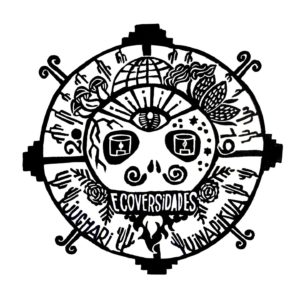
A linocut block print of collectively sourced symbols from the 2019 Ecoversities Alliance global gathering in Michoacán, Mexico. Ink on paper.
“In this reimagined way of learning there is also an emphasis on the reweaving of relationships and friendships, between each other and with the non-human, including our local ecologies. In this other way of learning together there is the primacy of an ethics and politics of care and an attention to that which is so often left out of educational institutions - the heart, healing, play, learning with and across different generations. There is also great emphasis in a learning of how to be together - to learn and inquire in solidarity with one another and in support of communities and the ecologies we inhabit. And in this re-imagination of learning we are also co-creating, and re-creating other ways of knowing, doing, becoming and relating.”
This ‘re-imagined learning’ that gets named over and over again in Ecoverse discourse lives in our intimate lives. Look, if we’re going to talk about the heart, we have to talk about desire. If we’re going to talk about relationships, we have to talk about attraction. If we’re learning together in ways that re-weave us back into ecological kinship, we’re talking also about bodies and families and homes. For all the infinitely complex possibilities of understanding ourselves and each other, we tend to accept pre-designed agreements (norms) so that we can relate to one another. So if we’re talking about bodies, families, desires and attractions, we’re definitely talking about the norms of gender, sex and sexuality. Every norm of inhabiting bodies and relationships that we don’t re-imagine will reinforce the violences, silencing, and erasures that come with their hegemonic productions. As our companero Chévanni Davids from South Afrika invited us to ask around a late-night fire in Michoacán, “Who benefits?” What power dynamics do we uphold when we replicate cultural norms that privilege some bodies and relationships at the expense of others?
The way I see it, producing knowledge about how we inhabit ourselves together is the most significant contribution radical educators can make to our future. The longing for intimate learning is at the core of everything we are and everything we are up to. What I want out of intentionally cultivating this medicine is to live unbound from traumatized and traumatizing colonial systems of gender and sex and in their stead easefully create flourishing embodied cultures of learning together. We will weave back into ecologies of relating from liberated bodies, every one of us a little bit more whole, every one of us more alive. I feel this future for us pounding in my heart. I chose to live queerly every day on behalf of this dream for us; and while queerness isn’t the cure, it does offer a perspective to be able to perceive what is sick about present cultural norms of embodiment. So consider this a nest I’ve woven for us at the peripheries of heteropatriarchy where we can nestle in and begin the conversation about embodied learning from our actual soft-animal bodies.
Queer: It’s a Pedagogy
Truly, my love affair with the brilliance of queerness is as expansive as the thing itself. It’s an identity. A strategy for surviving. An aesthetic. An orientation. A posture. A feeling. A mood. A politic. A Fuck You. A Yes Please. A fashion. A scene. A community. A critique. A ritual. A demand. A future. Some days queerness is hope itself.
And yes, it’s a pedagogy.
Not pedagogy as we’ve come to know it through our experiences of education in systems inherited from Empire – a study of how teaching can discipline, assimilate, master, control – but pedagogy as a passion for learning as unlearning, This is a pedagogy that wants to know in whose bodies, in what context; that already knows we become, unbecome and transform anew through knowledge and skills, yes, but also through desire and power. A queer pedagogy not only seeks “other ways of knowing, doing, becoming and relating;” it produces knowledge from the cracks of being othered from “normal” embodiment.
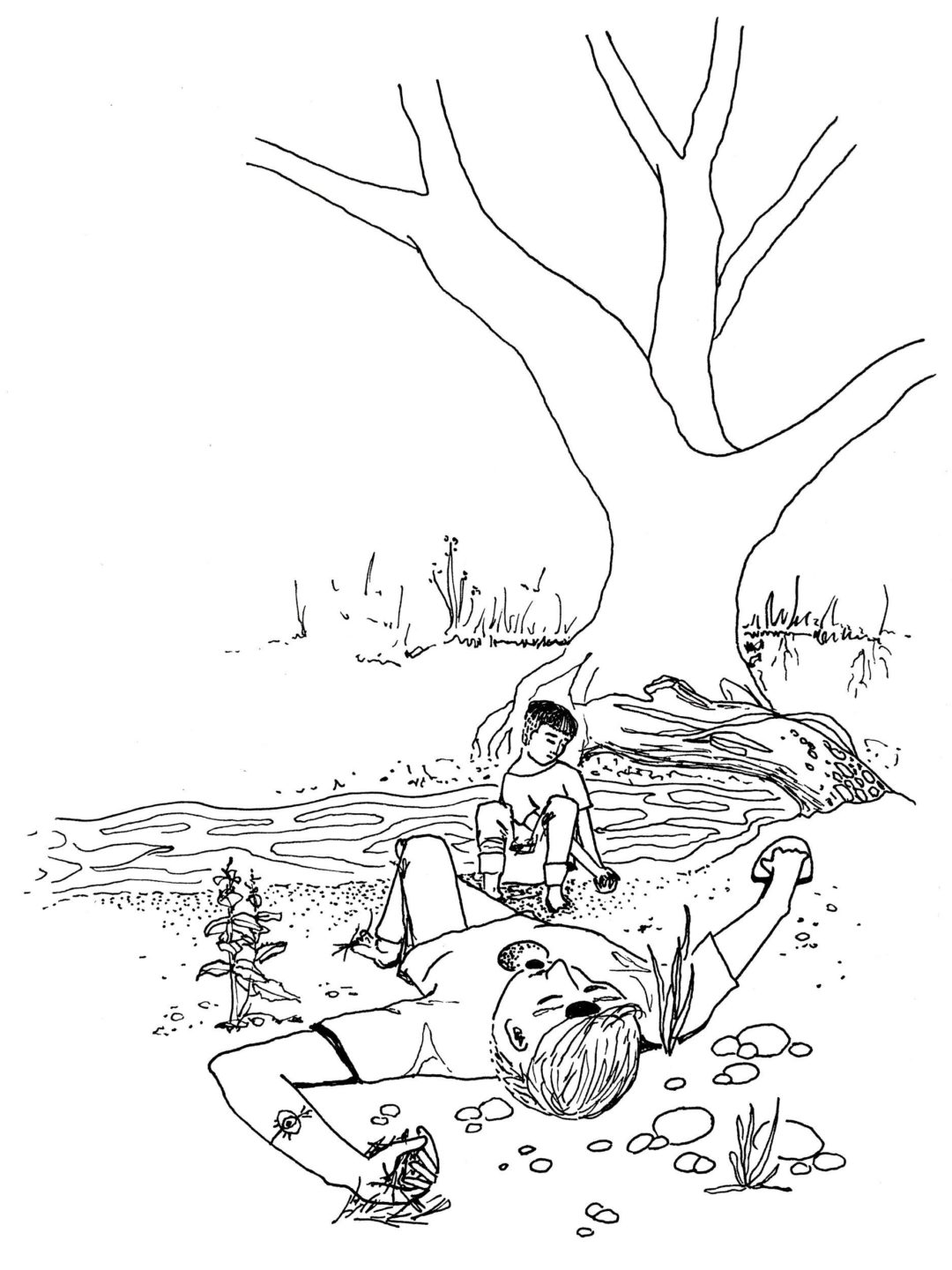
“The Pleasure of Never Arriving” Ink on Paper
Queer Pedagogy is the practice of producing knowledge and meaning in, with and from embodiments that exist outside of the bounds of anthropocentric normalcy. It is a way of learning that flips the script on oppression and campily claims the queer(ed) privilege of knowing otherness. Queer Pedagogy does more than elevate the knowledge of a community under erasure – it celebrates the erotic as a primary organizing principle of life, and seeks the wisdom of bodies that resist being disciplined, assimilated, mastered or controlled.
Many of the norms of embodiment that we inhabit and resist revolve around sex, gender and sexuality and are easily traceable to a pedigree of colonial pedagogy, that oft-occluded underbelly of education systems premised on ideologies of division, binarisation, separation, compartmentalisation, categorization, hierarchization, disembodiment, repression, secularisation, dehumanization. Embedded in this curriculum of empire are the invisible foundations of contemporary patriarchy, misogyny, homophobia, heteronormativity and rape culture. Much of queer culture stems from the discarded refuse of this project; it comes from queer bodies who were, we might say in polite company, uninvited to the party. We know that our non-binary bodies and desires that scramble logics of ones and zeros are a threat to Western post-enlightenment education because we have endured their violences and attempted erasures. Where masculine and feminine are taught as mutually exclusive, when death feels antithetical to life and nothing seems to escape division, queerness embraces totality – holding the whole that was split by too-narrow perceptions of duality and premised upon misconceived separability.
Queer pedagogy therefore requires closer attention to the porous frontiers of my endings and your beginnings. It requires intimate embodiment, flirting with the potential pleasure of surrendering to our entanglement. It embraces the both/and, names learning as a permanent site of becoming, searches for what else could be possible, demands multi-subjectivity, implies a perpetual move towards unintelligibility, relentlessly challenges norms. It asks us to bear the discomfort of this chaos of expansion, this learning process of inhabiting greater possibilities of being.
For these and many other reasons, I believe that we, radical educators, are queering education.
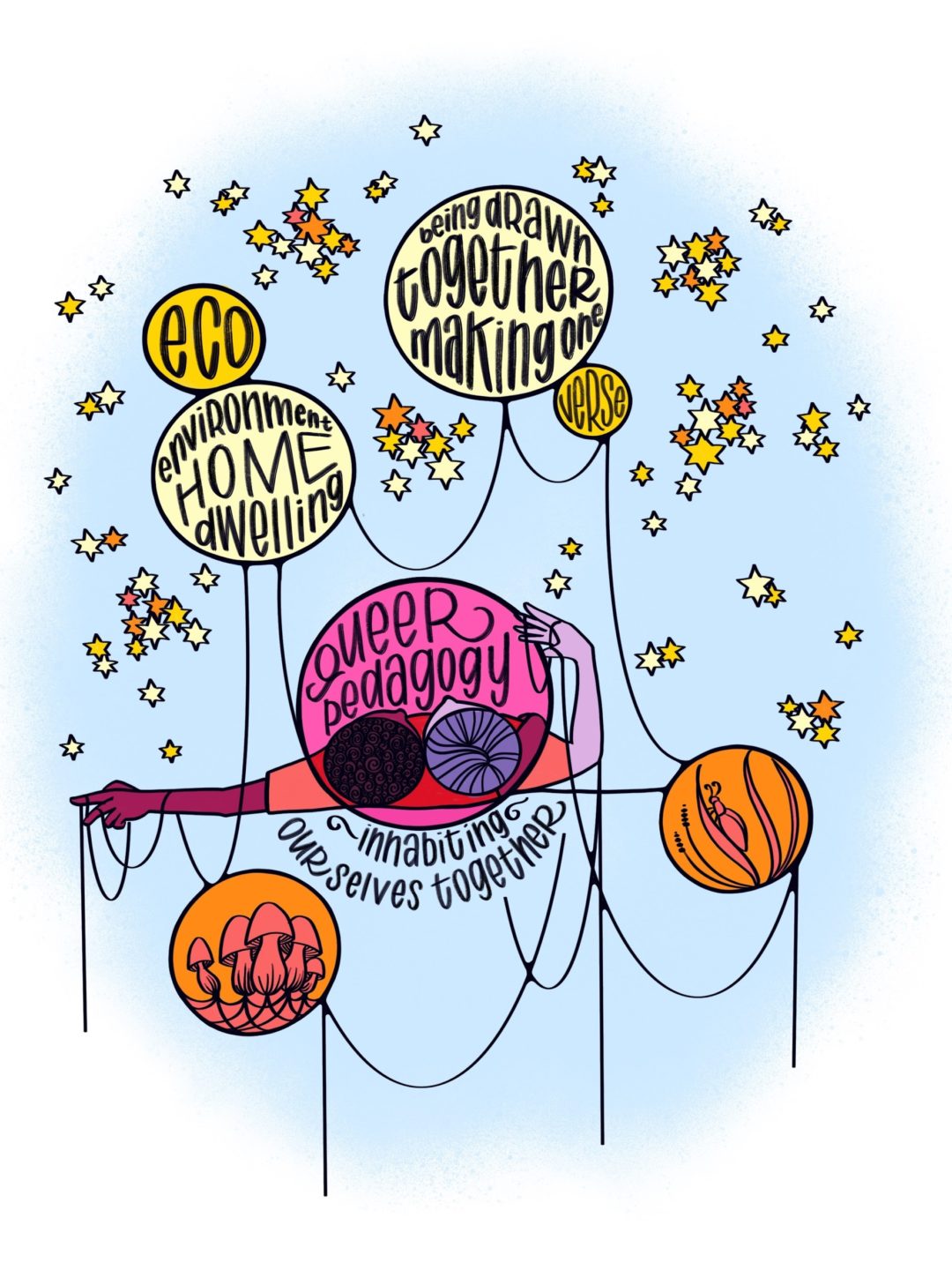
“Queer Pedagogy is in Our Name” Digital Illustration.
But queerness doesn’t come out of nowhere. Each individual “queer” body within our collective body already knows, on some level, how to reimagine education (a.k.a. life) through a queer pedagogy – not because we’ve studied it or taken it on as an interesting learning experiment, but as a function of our everyday existence as queer people. Queer people are in this sense natural political philosophers because we exist in structures that weren’t designed for us. Out of necessity and sometimes survival we must invent different structures to live, love and learn within. We find ways to inhabit bodies that are too complex to fit into gender binaries, we fashion families not sanctioned by state or religious institutions, and we inhabit diasporic homes when the ones we’re given don’t love us as much as we deserve.
Every one of us in the Ecoverse designing different structures to learn within are also taking up the task of imagining learning communities that are against and beyond the bounds of the educational normal. For those who decidedly walk out of school systems we’ve inherited from colonial regimes, demanding that learning be rewoven back into the fabric of living, our homes, our families, and our bodies become the new sites of our learning. Learning suddenly becomes intimate. Learning suddenly implicates us in each other, our desires, and eros. We talk a good game about finding deep connections and even family when we gather but I say ¡basta!, we can no longer meet each other with the word ‘love’ in our mouths while we shove desire into some dark, unexamined corner of our pedagogies. And when I say desire, I’m talking about it all: Eros. Attraction. Sensuality. Creativity. Sexuality. Sex. Passion. Creation. With self, with other humxns, with the divine.
If this feels like unsafe terrain, it is. Our bodies and intimate lives are not only realms of oft-unexamined desires, emotions, sensations and traumatic histories that influence how and what we learn. They are also the smallest sites where empire gets reproduced in our learning communities. Reimagine education without shedding light here? No thanks, honey. What good is reimagining from heads that have been disciplined to dissociate from our bodies? It’s not good enough to design learning spaces for liberation that don’t address the ways we (including queer people!) have internalized the desires of empire in order to survive. We don’t have the luxury of blaming an enemy ‘other’ that we can liberate ourselves “from” in the postmodern world of late-capitalism. Empire has leached its way into our bodies and seeped into all our interpersonal relations, weaponizing us against one another. This is why “safety” in our re-imagined learning spaces is a false hope, why fantasies of security are unattainable no matter how many walls, borders, police, and identity categories we create.
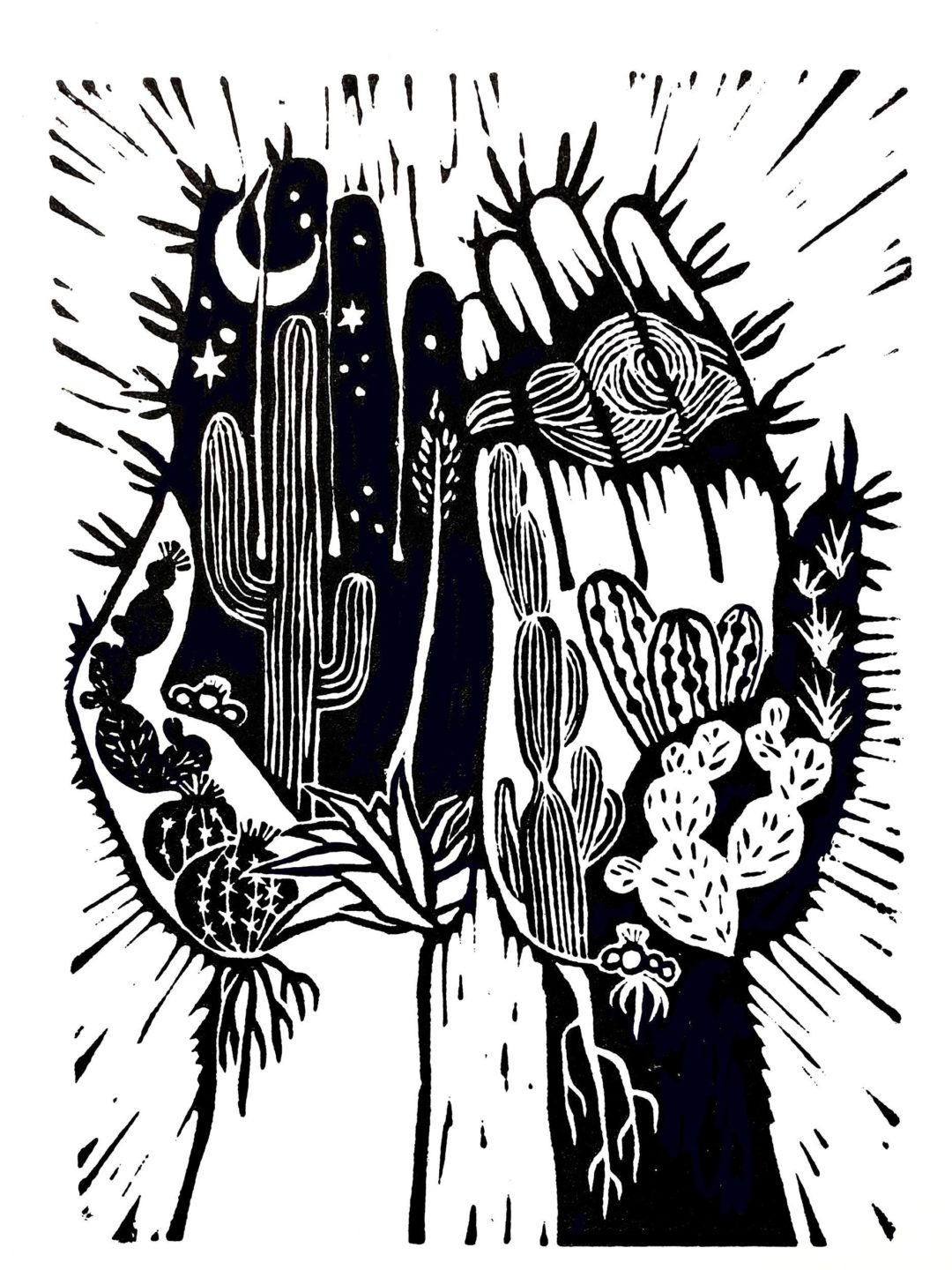
“Still We Reach Towards One Another” Linocut, ink on paper.
What I love about queerness, unbothered in the face of such insecurity because safety was never guaranteed to us in the first place, is that it is interested in these intimate space-times where power gets played out. Like all marginalized people, queers are invested in dismantling oppression that both lives out in the world in political, cultural, and economic institutions as well as the oppressions that we’ve internalized. There’s a thriving field of queer theory and well-developed bodies of literature and art about this work of examining both power and intimacy (Audre Lorde gifted us “The Erotic as Power” fourty-two years ago). There are innumerable sub-cultures we’ve built around understanding gender, performance, love, desire and power, from BDSM to drag and ball culture, relationship anarchy and so many others (remind me to teach you how to play “top, bottom, vers”). This is not amateur hour, y’all – queers have long been up to something around reimagining embodied ways of living and learning. Is it a wonder that we’ve been cast as threatening to the order and decency that hegemony relies on??
But let me widen the aperture here back to radical educators queering education. I like to think that queers and radical educators alike are all stories of failed “products,” quite literally, of modernity. Just as I’m the kind of queer person who’s not seeking rights, access or membership to the cultural disaster of violent hetero-patriarchy, radical educators are not seeking legitimacy from education systems that teach obedience, normalize exploitation, and propagate trillions of dollars of student debt globally. We’re all trying to figure out how to get out of this game of regurgitating internalized oppression and vomiting it into the mouths of the next generation. And they would call us quitters, but every one of us knows it’s not losing when we decide to stop playing a game that’s killing us, to turn around and walk the other way.
So here we are, finding each other in the field of possibilities that lies beyond our resounding “NO!” — queers, radical educators, queer radical educators and many, many other dissidents, all held tenderly within this wombspace asking each other: “what else?”
Point a Finger at Someone Else and Three Point Back at Yourself
Being situated in what often feels like the belly of empire (I live on unceded and occupied Ohlone territory in Oakland, CA, Turtle Island), for me this work begins in reflexively and explicitly attending to my geo-political, racial/ethnic, gendered and embodied identities and experiences and the way they inform the scope of my lens. I want to be clear: my intention here is not to flip the hierarchy and place queers and queerness above straight people and heterosexuality (categories with very blurry boundaries indeed). Queerness is my starting place. It is not the hero of this story and my love for the queer doesn’t come without a crucial reckoning with the history of the western post-enlightenment gaze towards sexuality. I’m trying to portray what I know of U.S. based queerness from all of her angles, even in bad lighting and without stage makeup as a complex, living cultural being out here figuring her shit out just like the rest of us. I believe that we all deserve the space to be and be seen for all of our complexities.
It is precisely because of this deep love of queerness that I am concerned with the enormous risk of (white) U.S.-centric and otherwise hegemonic queerness being deployed as just one more weapon in the arsenal of cultural imperialism heaved at the rest of the world. It must be named that, just as Victorian homosexuality taboos were once levied against non-western cultures as signs of sinfulness and backwardness, we now see western culture congratulating itself for being the epicenter of liberalism and “human rights,” casting traditional cultures as antagonists to freedom. Given this ongoing arrogance of U.S. sexual exceptionalism, WASP-incited cultural genocides and hegemony sticking its meddling fingers in everyone’s sex lives, for queerness to have value in transnational communities such as our Ecoversities Alliance, it can’t be ahistorical and it can’t be neutral.
One place to begin is to disaggregate queer and trans Black and Indigenous people of color (QTBIPOC for those who love an acronym) from what might get flattened into a singular U.S. perspective. From E. Patrick Johnson’s theoretical shift from queer to “quare” to the (Brasilian) Portuguese spelling “cuir,” and many emerging categories such as “diversidades” and “dissidencias” across Abya Yala, there are abundant examples of racialized, localized renditions of queerness – an identity that as Johnson says, has a “spirit of openness but, like all identity categories, tends towards homogenization.” To hold space for queerness to have nuance, complexity and sometimes paradox is to allow for the tension that living systems require. Anything that’s fixed and stable is dead, and on many fronts, we are fighting hard for our lives. So with queerness evolving in all directions at all times, I name it all as true and accept my role in shaping a future in which queerness is explicitly anti-colonial.
U.S. based queers have work to do to show up and demonstrate our willingness to betray safer iterations of queerness – from mediocre corporate taglines to postures of liberal tolerance – and instead choose to decolonize in alliance, solidarity, and real rebellion toward all intersecting hegemonies. It’s self reflexive work that investigates the ways queerness, too, has internalized hegemony or as adrienne marie brown puts it, ‘what are the ways in which we collaborate with our own oppression?’
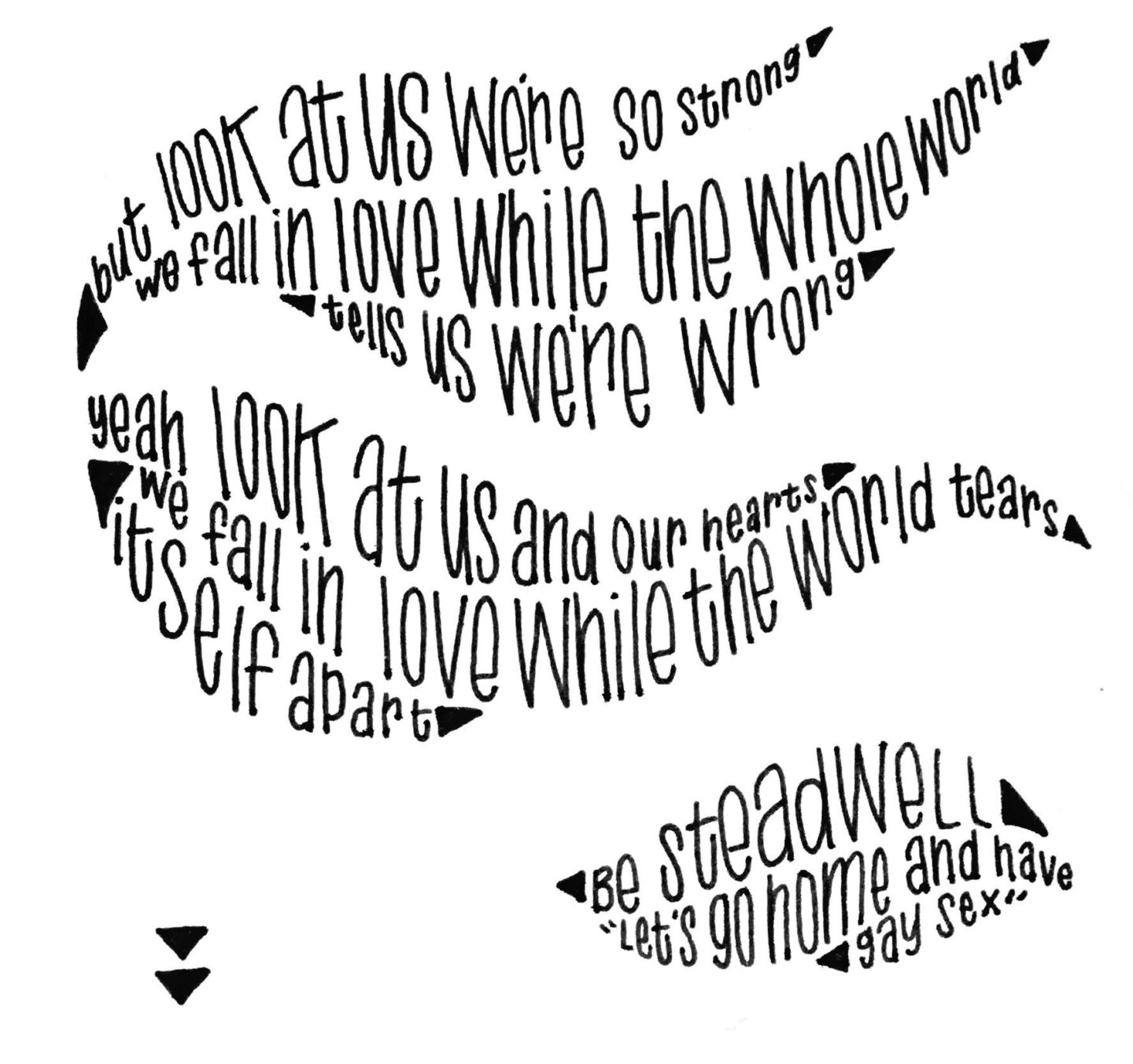
Quote from Be Steadwell’s “Let’s Go Home and Have Gay Sex” from the album Queer Love Songs. Ink on paper.
Several of us within and beyond the Ecoverse are therefore taking up the task of transnationally weaving a tapestry of a global narrative of queer living, learning and being. It’s work that values and centers indigenous, Black and global South communities and epistemologies and is actively decolonizing queerness that has grown out of colonial, white supremacist foundations. We envision networks of radical learning spaces like our ecoversities as playgrounds for exploding together the definition of who and what is queer, asking how queer pedagogy could deliver us from heteronormative learning spaces and fundamentally questioning if the (English) word “queer” carries too much of a colonial burden to be useful at all.
I’m not asking anyone to be queer or identify with queerness, nor am I giving blessings to start instrumentalizing queerness as a sign of your wokeness. I believe that using wisdom from the margins requires us to investigate the ways our actions and inactions impact the material conditions of those living on said margins. In this way, for the Ecoverse to be ‘queering’ is to be divesting in structures built on heteropatriarchal violences. It is to be asking yourself: what are your current investments in heteronormativity and what are you actually willing to dismantle? What might designing new education systems that are post-patriarchal really require of you? What is the just-right place for you to begin? What does surrendering power for belonging actually look like? And can we envision it being pleasurable, paying attention as an act of devotion, not only to our own bodies but the collective cultural bodies to which we also belong?
Body Politics, Cultural Somatics and Better Metaphors
I get real jazzed about re-imagining education from our bodies because the body is a metaphor that is used as a blueprint for our most powerful political and cultural institutions. Political theorists use the concept of ‘biopolitics’ to name how institutions of power discipline bodies to behave in socially and politically acceptable ways (shout out to Michel Foucault who identified sexuality as a key element of this political technology that is effectively deployed to control entire populations). But body politics also reveal how many systemic structures and institutions are modeled after bodies, families, homes and other intimate place-times. We have, for example, ‘heads of state,’ ‘founding fathers,’ and ‘homeland security.’ This metaphorical link between the singular and collective body makes visible the scalability of embodied learning and reveals the opportunity for every act and even existence itself to be a potentially insurrectionary one.
Cultural Somatics, an emerging field of theory and practice that I study under Tada Hozumi, builds on the biopolitical body metaphor by proposing that the collective consciousness (a concept from Carl Jung) is not a disembodied ethereal brain; rather, these collective bodies that we call cultures have invisible somas (bodies) with complete nervous systems that emerge from networks of complex relationships. Just as trauma can be inherited epigenetically from our ancestors, so too have we inherited the genetic makeup of collective trauma responses that become normalized into culture over generations. Perceiving cultures as having somas gives us the framework to understand cultural expressions of harm as the systemic traumas that they are.
As trauma lives in the body, so too does it show up in the cultural body. Cultural Somatics names trauma in the nervous system of the cultural soma as systemic oppression, posturing itself through all types of cultural productions in similar ways as it manifests in our physical bodies such as lack of empathy, urgency, hypervigilance, individualism, contraction. An example: an unmistakable sign that there’s trauma in a body is the presence of binary thinking. Unable to process information in a trauma state, the body (including the brain) reacts by contracting which blocks the flow of complex information. It follows that the gender binary is a traumatized system of organizing and understanding gender, and that queerness’ transcendence of the gender binary is both a form and function of cultural healing. We as members of this broader cultural body are simultaneously subjected to these structural violences and complicit in their reproduction.
Finding our power neither in innocence nor victimhood, we can address these trauma-oppressions by fine tuning our understanding of the inseparability of our individual and collective healing. Another example: because the family is our first encounter with governance, we tend to pattern our behavior to authority in ways that mirror a parent-child relationship, projecting early childhood attachment woundings into civic life. What’s more, the nation state is designed after a very specific idealized nuclear hetero-monogamous family. Of all the varieties of family structures, it comes as no surprise that the rise of the nuclear family in the 20th century parallels industrialization, hyperindividualism, neoliberalism, and climate change amongst other devastating consequences, with the strongest impact on more or less everyone who’s not a white heterosexual American.
Hence, metaphors of body, family and home articulate why emancipatory sex, gender and sexuality politics are highly relevant and valuable in the Ecoverse: these most intimate aspects of doing life in our individual bodies are linked via biopolitical metaphors to systemic level bodies (networks), families (cultural norms), and home (nation states), making our ecoversities effective sites of intervention into the systemic that begin at the human level and scale through a nested or fractal pattern. As we come together in gatherings and exchanges, weaving kinship to one another that seeks to challenge norms, we are making an – albeit unintentionally – queer family of sorts, and thank god/ess(es). Our named interest in re-weaving relationships invokes a kind of biopolitics from below, where we regulate ourselves – not in fear of panoptic discipline or punishment from the powers over us, but because we know that caring for one another creates wellness in the entire collective body. And with traumas (oppressions) in the collective body as big as colonialism, patriarchy, and white supremacy, we have our work cut out for us.
Cultural somatics takes an animist lens and names these traumas as beings in the cultural soma that live their own lives beyond our design or comprehension. Gloria Anzaldúa says it beautifully in Luz en lo Oscuro: “According to archetypal psychology, we have internalized the old deities, animals, and forces of nature that our ancestors considered gods. We could say that metaphors are allies, spirits (transformative aspects of the unconscious seeking to enter the conscious).” We claim our healing by calling in these well ancestors, more-than-humxn kin, and other guide-beings to reestablish a resourced baseline from which we can begin to address challenges.
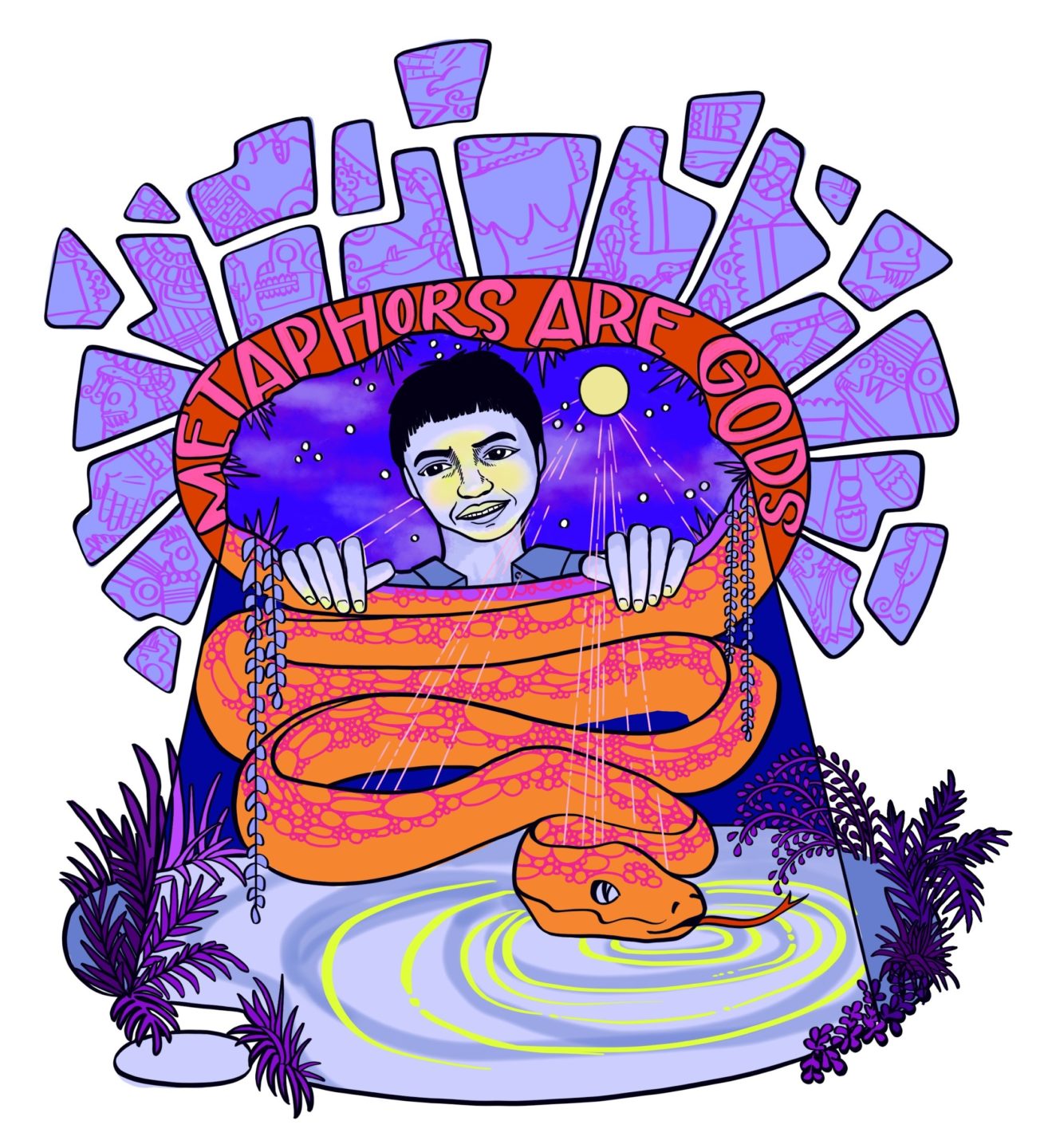
“Gloria, Coyolxauhqui y la Naguala en la Boca de un Cenote” Digital Illustration.
A queer, cultural somatic lens thus enables us to face big systems of control, domination, supremacy and power over us by enabling us to sense-feel into other kinds of power we may have when facing god- and demon-sized cultural trauma-oppressions. Such a queer pedagogy, rooted in embodied knowings of elsewheres and otherwises, invites us to shift our orientation from fighting the trauma to healing it – an imperative disposition of what The Emergence Network names as (com)post-activism: a theory of change based not on fighting the system but on making enough space for ourselves to be creating and loving a new one into being together. It knows that fighting for access, representation and even justice when we’re up against cultural trauma beings as powerful as white supremacy, homophobia, misogyny, and colonialism – that live not only in the cultural body but in our very own – is really never a game we are going to win. It is a healing perspective where we, yes, absolutely engage with violence and injustice, but in ways that attempt to not cause further harm to our bodies.
Decolonization Literally Turns Me On
I know, I know, postmodernity ate the word decolonization for breakfast and shat it out five minutes later. I have been trying to get to know decolonization as if it lives its own life outside of my (and our) definitions, spending time with and imagining it/them as a living entity in the cultural soma. From this feel-sensing place, I’ve found a small slice of the imperative decolonize that feels alive and workable: to decolonize is to heal from colonial trauma. As trauma lives in the body, decolonizing is a practice of healing situated both in our individual bodies and in the cultural body. Tía Gloria again gives us a lead on how to begin: “decolonizing reality consists of unlearning consensual “reality”…To change or reinvent reality, you engage the faculdad of your imagination.” Good news for us re-imaginers!
For every one of us who sat in classrooms for years at tables cutting off our lower bodies and disconnecting us from our gut, intuition and sexual and reproductive organs, in bodies trained to be obedient and desires overpowered, it is imperative now, as a precursor to reimagining, to be in our bodies and reconnect with our centers where Eros lives and where life begins. If we don’t know where our own desire lives, we leave the door open for someone else to tell us who and how to love, what to want, why to learn; to traumatize us and shrink our creative power, only to then fill us up with the desires of empire. We will not re-imagine. We will reproduce. We will replicate.
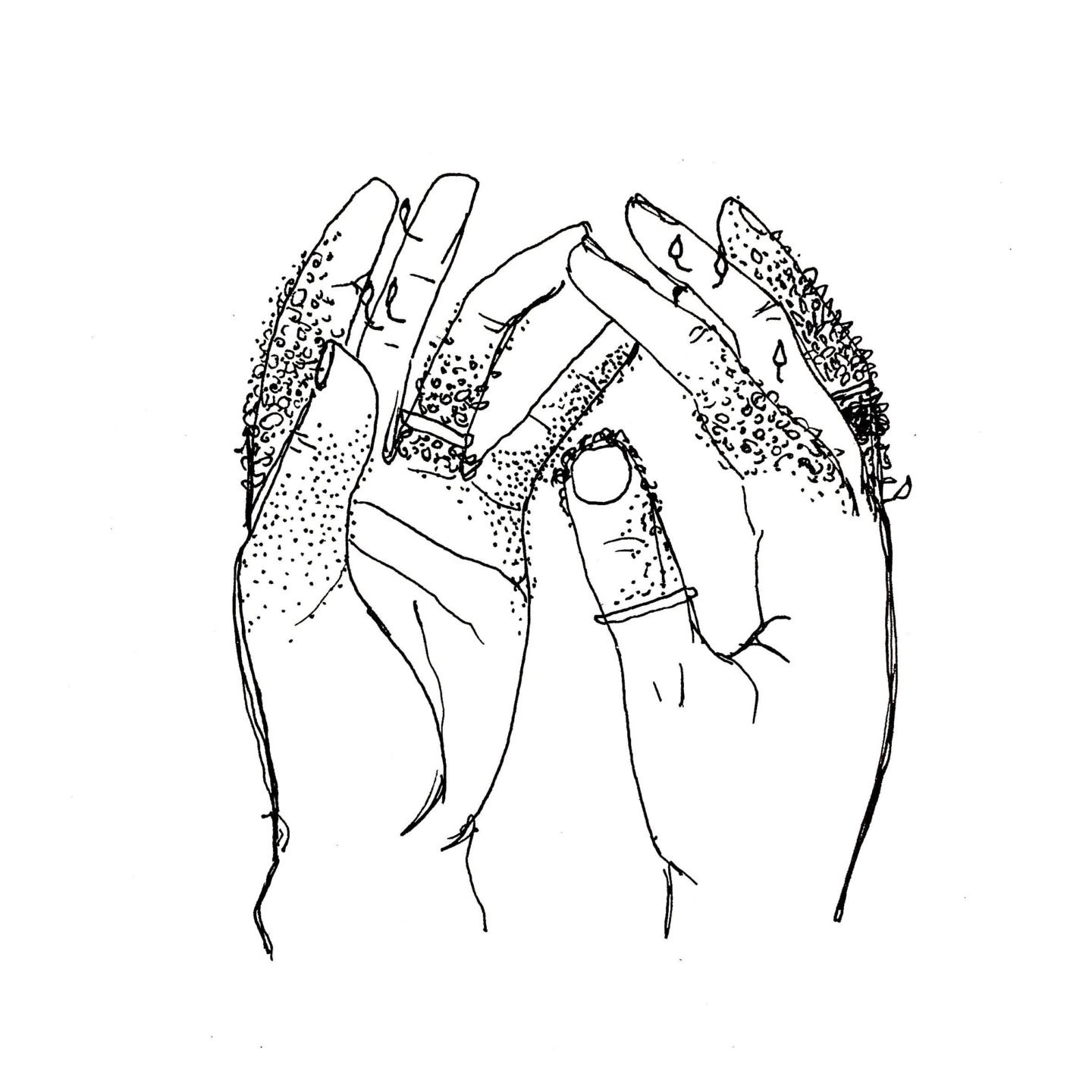
“Dream 4/13/20” Ink on paper.
Friends, trauma and scarcity may be what we’ve inherited, but like every ancestor in our collective tapestry, it is what we will spend our limited humxn lifetimes attempting to not pass on. Decolonizing requires healing from this trauma and healing trauma requires accessing and staying in our bodies and desires. That makes decolonizing education a queer thing to do. It very literally requires turning our bodies back on, reclaiming them from dusty, colonial and traumatized parameters of gender expression and scarce options for who and how to love.
Queerness has the power to dom the empire out of us. I’m re-imagining the pain of decolonizing as the key to our deepest pleasure. I’m fantasizing about decolonial education that happens in bodies that move with the kind of freedom that tells the story of radical self love. Teaching that happens between people who long for each other because we know that the wholeness we seek is in our interconnectivity. Learning on land that we love like the body of a lover, the learning of lovers as whole landscapes. Loving this way will be how we know we are alive.
You were wondering when I was going to get to the sexy part!
But romantic, too, darlings, don’t forget that. I know queers have a reputation as sexual deviants, but hear this: Buddhist teacher Tara Brach says the english word “desire” has latin roots: desiderare, meaning “away from your star.” Let’s talk about reclaiming desire as the longing that arises from being away from what you love, longing as separation from source. So much of colonial trauma has its roots in separating us from each other and from the earth. Arguably, the foundation of all colonial violence of separation is the separation from desire, an energy that organizes the flourishing of life itself. What does this type of cosmic-level romance do as a learning objective? What does it mean for how we design learning programs to know that attraction to other life is at the core of what it means to be alive?
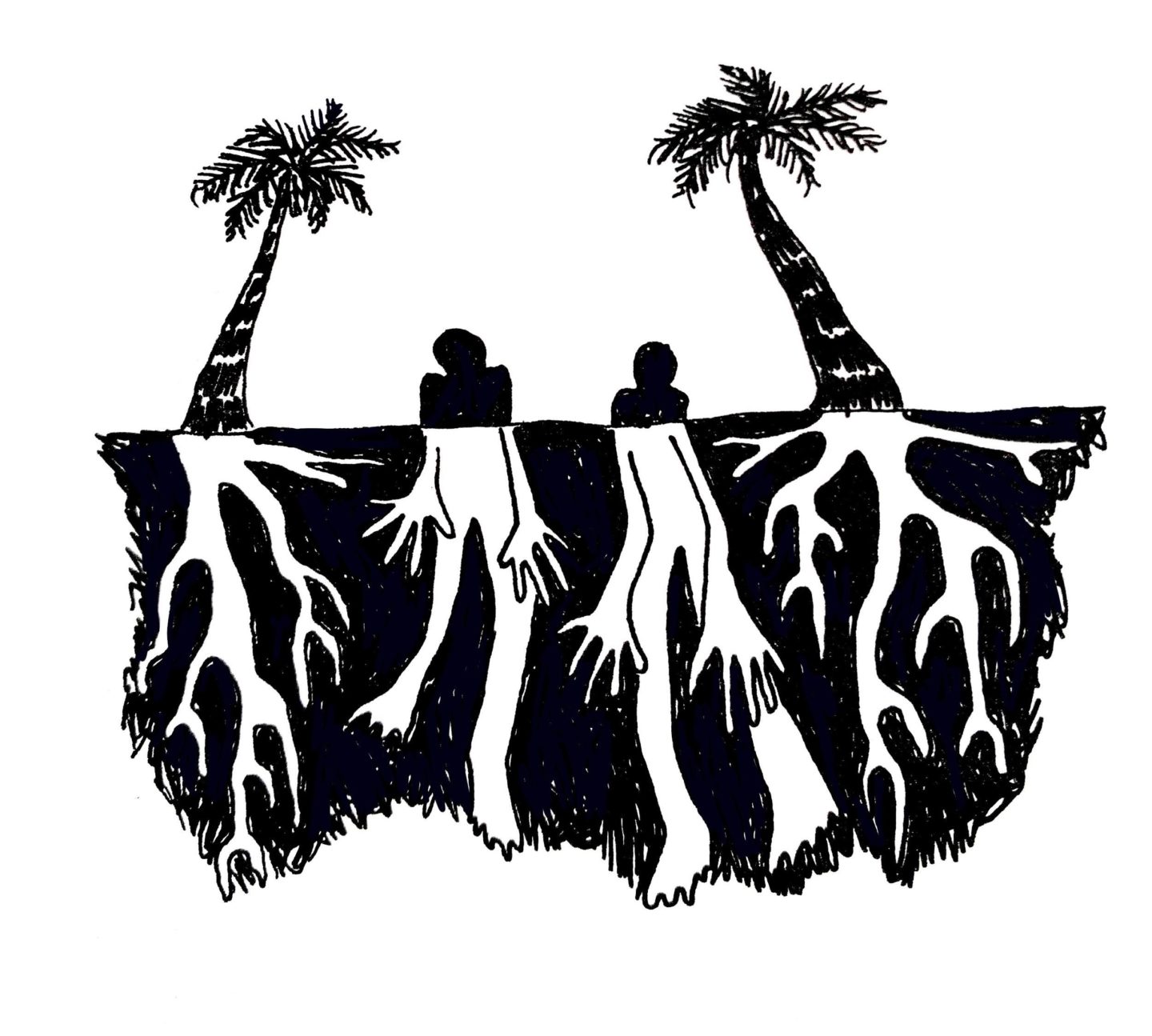
“Dream 3/26/20” Ink on paper.
Oh hello, internalized, repressive voice freaking out in my head: ‘sexuality doesn’t have a place in classrooms! Focusing on sex in this hypersexual age is the last thing we need!’ So nice of you to drop in uninvited. I have to remind this scared voice that it is not desire that is wrong, bad or sinful, but rather its being made too narrow, too small. Contracted (traumatized) desire seeks substitutes for what it really wants. Reward. Relief. Addiction. Expansive desire – ‘devotion to the infinite’ (Sri Nasargadata) – is on the contrary reintegrating into a knowing of infinite interdependence, of complete and unequivocal belonging (I trust the Buddhists on this one; I mean, they have been teaching non-duality for centuries).
Many kindred of the Ecoverse are already on this path. We are walking out of sterile classrooms, concrete buildings, desks, (disem)powerpoints, shoes, and are instead choosing the pleasure of learning with our toes in the sand, hearts to forest floor, breeze flirting with skin. We’re saying no to learning spaces that deaden our senses, instead choosing to turn on our bodies and tune in to all of our nerve endings and what and who they point our attention towards.
Humxns Are Not Tofu, or Why We Need A Pedagogy of Knowing Ourselves
For those of us who have internalized Empire, our work is not to wage war on our bodies but to heal. This healing starts with reconnecting to love in all its messiness, remembering we have a star, and sitting compassionately with the traumas of colonial violence that would have us believe we are separate from all other life. By pulling us out of relationship with the living and into classrooms that groom us to dissociate from our bodies and flatten our desires between pages of textbooks, school leaves us disconnected from ourselves and each other, and extremely vulnerable. Stripped of our desires and disciplined into passively accepting the syllabus of empire, they’ve primed us for the trillion-dollar industries marketing their desires to us like we’re squishy, insipid blocks of tofu awaiting seasoning. Queer pedagogy is the spirit that grabs you by the shoulders, looks you in the eye and declares: baby, you are nobody’s tofu. Seeing the fear of death (transformation) in your eyes, QP will wrap you up and remind you that there is nothing more tragic than living in a dead way; that learning, being, and becoming – not just in other ways but as the other – is a way from dissociative trauma back into our bodies, our desires, our aliveness.
I do this healing work every day as if my life depends on it and, as a product of the aforementioned colonial school system, on many of these days it feels like I’m starting from zero. I get pretty salty when I think about having to sit through sixteen years — exactly half of my life — of the white supremacist version of U.S. american history while nobody bothered to teach us how to love. I am so hungry for justice, so full of love and sharp objects, and terrified of hurting people with this very imperfect love that I have had to scrap together out of the cultural disaster of heteropatriarchy.
So I say this just as much to myself as I say it to you, compas: we must bravely teach ourselves how to love. What could be more important? Empire waits at every door to ourselves we leave open (including our imaginations), always ready to infect us with death-drive desires on the relentless 24h news cycle like it’s their freaking job (oh, wait, it is). The cultural soma desperately needs the medicine of how to be in right relationship to itself which is exactly what a queer pedagogy is after: attenuating to how we choose to be in relationship with each other and how we choose to love each other. Attenuating to how we are in relationship with ourselves and how we chose to love ourselves. When we get this right, the Ecoverse will mushroom into a true global alternative to colonial education; no need to recruit, we will simply attract people’s hearts to healing and justice because we are living proof of the better story.
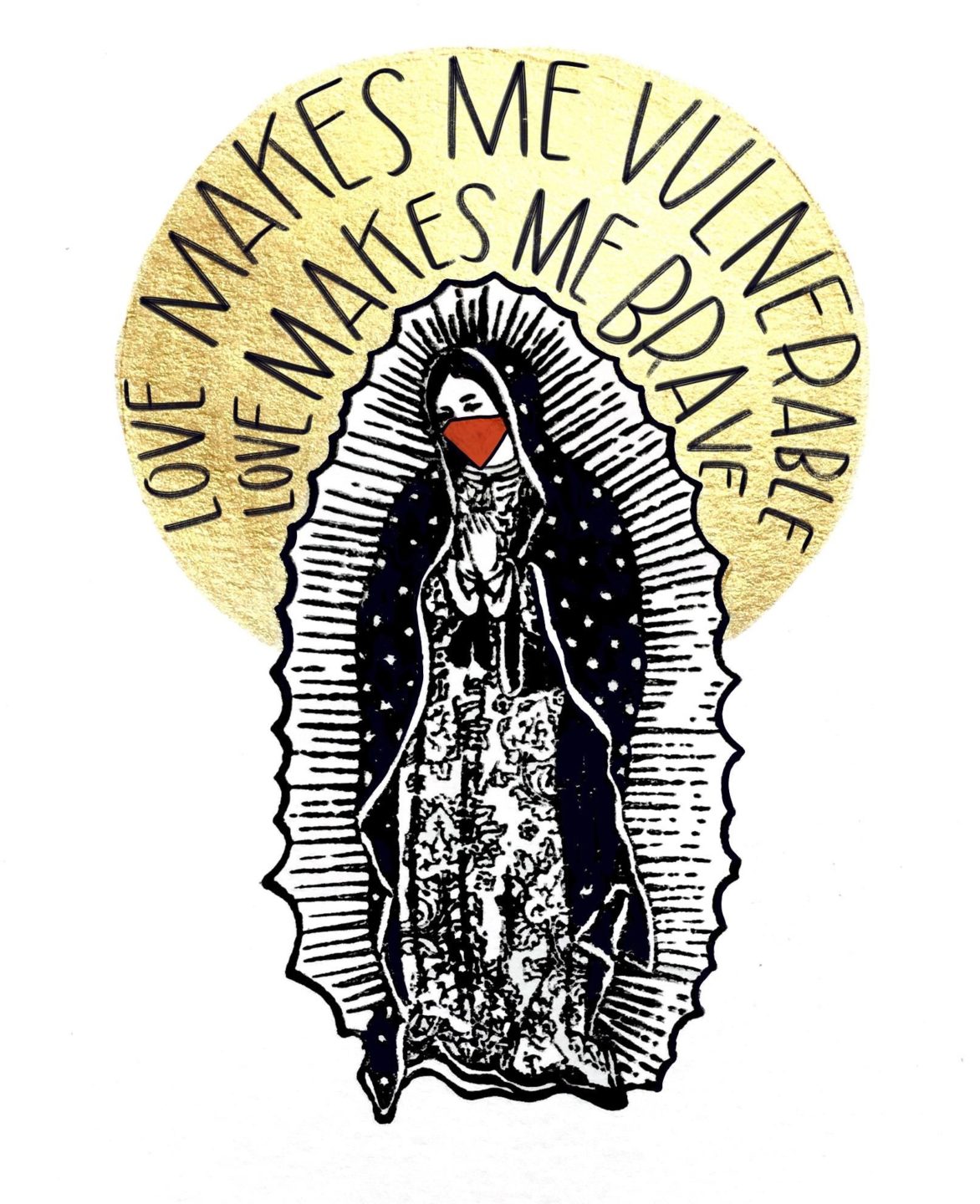
“Tonantzin, Zapatista Remix” Mixed Media on paper.
I started off by saying that radical educators are queering education. My deeper belief is that reimagining anything (questioning and revising limits, biases and boundaries with agency and autonomy) is a queer thing to do. And queers are particularly skilled at re-imagining – you have to re-imagine you own future when you’re told you don’t have one (a small example: despite the neoliberal linear progress narrative, The American Medical Association has called the rising murder rates of transgender people, particularly black trans women, a growing epidemic). Because queer people are constantly re-imagining our own bodies, families and homes and all that comes with these intimate place-times, I propose that we deliberately name radical education as queer pedagogy and that these queer pedagogies be explicitly informed by the queer bodies that, across every culture, age and species, play a vital role in a balanced ecosystem, cultural and otherwise.
How do we nurture such a queer pedagogy which is, at its core, a pedagogy of knowing ourselves? As designers of the learning spaces of the future, how might we not just gesture towards, but emerge from and inhabit pedagogies that are healing colonialism? I’m longing to know what kinds of space-times and shapes and relationships we would make if we actively divested from patriarchy, heteronormativity and cisnormativity in our projects. I’m hungering to know what would happen if we intentionally leaned into the brilliance of our queering of educational norms, if we allied ourselves with the queer other, flipping the script on the strangeness, ironically, of normativity.
I imagine this looking like learning together in ways that feel passionate. Everybody from Pablo Neruda to the Buddha knows that it is only the most expansively passionate loving that alchemizes duality back to oneness, to wholeness. I imagine our learning feeling pleasurable, but let me slow down with that word. Because of course, while pleasure is affixed to the body, that does not make it decolonial – far from it. I don’t mean the pleasures of self-congratulation, of soothing the impact of building our lives on blood and lies, or the pleasure of consuming the wisdom from the margins while enjoying the comfort of the norms at the center. I don’t mean the kind of pleasure that we can purchase after doing the work of maintaining empire. I’m evoking the kind of pleasure that feels like giving up power for belonging, where belonging is entanglement in a web of reciprocity and accountability. A kind of pleasure that cannot be felt and kept unless it is also enacted, a verb. The kind of pleasure that, if clutched in fear of scarcity will rot in the hand but, if sewn-sown into the fabric-soil of life, can burst through the inertia of dissociation and will fight like hell to truly be alive.
This is my prayer to get us started.
Bibliography/Further Reading
Books
Revolutionary Mothering – Eds. Alexis Pauline Gumbs, China Martens, Mai’a Williams
Pleasure Activism: The Politics of Feeling Good – Adrienne Marie Brown
The Cultural Politics of Emotion – Sarah Ahmed
Discipline & Punish: The Birth of the Prison – Michel Foucault
Light In the Dark/Luz en Lo Oscuro – Gloria Anzaldúa
Epistemologies of the South – Boaventura De Souza Santos
Articles
“Uses of the Erotic: The Erotic as Power” – Audre Lorde
“Queer Times, Queer Assemblages” – Jasbir Puar
“Quare” Studies, or “(Almost) Everything I Know About Queer Studies I Learned from My Grandmother – E. Patrick Johnson
“The Nuclear Family Was a Mistake” – The Atlantic
“Decolonization Is Not a Metaphor” – Tuck & Yang
“Dewdrops on A Lotus Leaf: Mournful Reflections on Eros and Pedagogy” – Tada Hozumi
Cultural Somatics
https://ritualasjustice.school/
Podcasts
When It Comes To Our Politics, Family Matters -Hidden Brain
Desire and Addiction: Voices of Longing Calling You Home – Tara Brach
Cultural Somatics – Tada Hozumi @ritualasjusticeschool
Queer Nature – Instagram @queernature
BIO
Kate’s work as a graphic recorder, visual facilitator, writer, printmaker and culture creator uses story, memory, affect, intuition and divination to help the wisdom in a collective be known to itself. A mestizx gender secessionist and in all ways and forever rebel border crosser, Kate is currently making home on Ohlone territory in Oakland, CA where they are a Cultural Somatics practitioner learning how to love well, parent in community, listen to the plants, play capoeira, and be as queer as possible. @crowcamino | www.asthecrowfliesdesign.com
